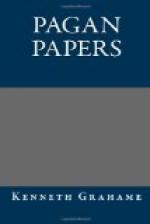One morning late in March, at the end of a long hard winter, I was wakened by a flood of sunshine. The early air came warm and soft through the open window; the first magic suggestion of spring was abroad, with its whispered hints of daffodils and budding hawthorns; and one’s blood danced to imagined pipings of Pan from happy fields far distant. At once I thought of Fothergill, and, with a certain foreboding of ill, made my way down to Holly Lodge as soon as possible. It was with no surprise at all that I heard that the master was missing. In the very first of the morning, it seemed, or ever the earliest under-housemaid had begun to set man-traps on the stairs and along the passages, he must have quietly left the house. The servants were cheerful enough, nevertheless, and thought the master must only have ``gone for a nice long walk,’’ and so on, after the manner of their kind. Without a word I turned my steps to the coach-house. Sure enough, the old cart was missing; the mare was gone from the paddock. It was no good my saying anything; pursuit of this wild haunter of tracks and by-paths would have been futile indeed. So I kept my own counsel. Fothergill never returned to Holly Lodge, and has been more secret and evasive since his last flight, rarely venturing on old camping grounds near home, like to a bird scared by the fowler’s gun.
Once indeed, since then, while engaged in pursuit of the shy quarry known as the Early Perp., late Dec., E. Eng., and the like, specimens of which I was tracking down in the west, I hit upon him by accident; hearing in an old village rumours concerning a strange man in a cart who neither carried samples nor pushed the brewing interest by other means than average personal consumption — tales already beginning to be distorted into material for the myth of the future. I found him friendly as ever, equally ready to spin his yarns. As the evening wore on, I ventured upon an allusion to past times and Holly Lodge; but his air of puzzled politeness convinced me that the whole thing had passed out of his mind, as a slight but disagreeable incident in the even tenor of his nomadic existence.
After all, his gains may have outbalanced his losses. Had he cared, he might, with his conversational gifts, have been a social success; certainly, I think, an artistic one. He had great powers, had any impulse been present to urge him to execution and achievement. But he was for none of these things. Contemplative, receptive, with a keen sense of certain sub-tones and side aspects of life unseen by most, he doubtless chose wisely to enjoy life his own way, and to gather from the fleeting days what bliss they had to give, nor spend them in toiling for a harvest to be reaped when he was dust.
Some for the glories of this life, and
some
Sigh for the Prophet’s Paradise
to come:
Ah, take the cash and let the credit go,
Nor heed the rumble of a distant drum.




